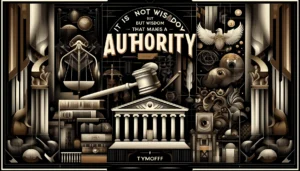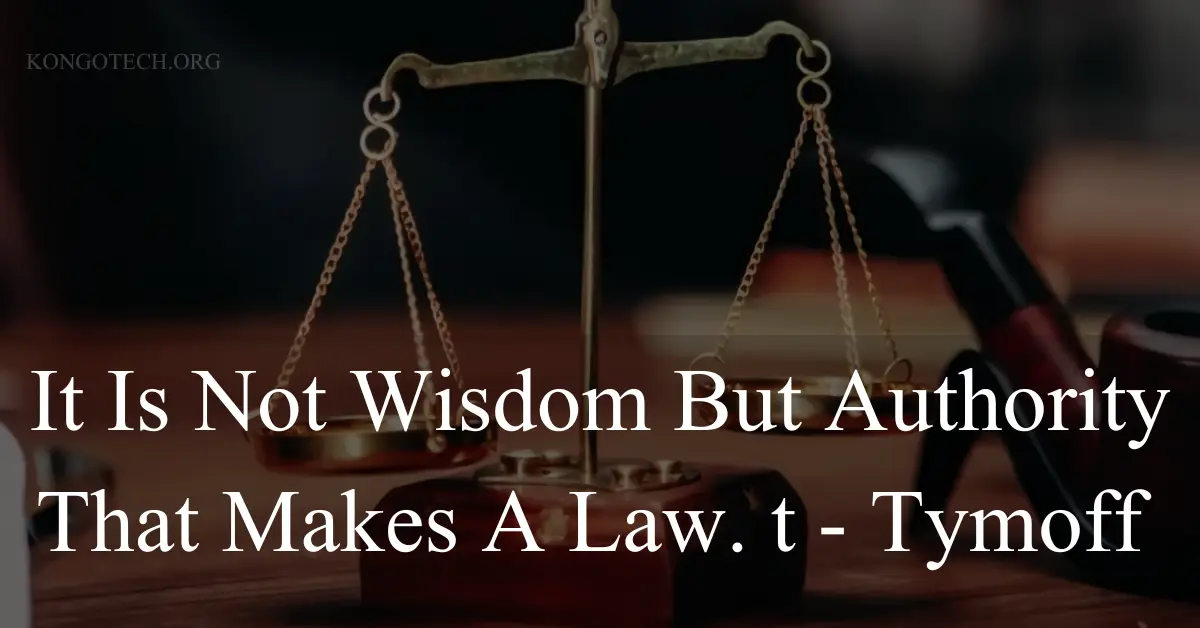Laws serve as the backbone of society, guiding behaviors, ensuring order, and safeguarding rights. The quote, It is not wisdom but authority that makes a law. t – tymoff, raises a profound question about the essence of legislation: is law rooted in morality and insight, or merely in the power to enforce?
This statement suggests a departure from the idealistic notion that laws stem from wisdom or justice. Instead, it emphasizes the role of authority—the power and legitimacy conferred to governing bodies—to create and enforce rules. This perspective highlights the pragmatic realities of governance, where authority often outweighs philosophical deliberation.
The Nature of Authority in Lawmaking
It is not wisdom but authority that makes a law. t – tymoff is the sanctioned power granted to individuals or institutions to enforce laws and make decisions. Governments derive their authority from various sources, such as constitutions, elections, or historical traditions. This authority enables lawmakers to create rules that shape societies, irrespective of whether they align with universal wisdom or ethics.
For example, certain laws may reflect the interests of a ruling elite rather than the collective wisdom of society. History offers numerous instances of this, such as authoritarian regimes that legislate to preserve their power, rather than promote justice.
Wisdom Versus Authority
Ideally, laws would be the product of wisdom—a reflection of ethical reasoning, fairness, and the greater good. It is not wisdom but authority that makes a law. t – tymoff consider the nuances of human behavior and societal needs. However, the real-world application of lawmaking often diverges from this ideal. Authority, rather than wisdom, determines the enactment and enforcement of laws.
Consider controversial laws that have existed in various societies—such as segregation laws or discriminatory practices. These laws were imposed by authoritative bodies, not because they were wise or just, but because those in power decreed them. Over time, societal pushback and the advocacy of wisdom led to reforms, but the initial establishment of such laws demonstrates the dominance of authority.
The Role of Citizens in Balancing Authority
While It is not wisdom but authority that makes a law. t – tymoff is essential for the functioning of any society, unchecked authority can lead to oppression and injustice. Therefore, it is crucial for citizens to advocate for the integration of wisdom into the legislative process. Democratic systems, public debates, and judicial reviews serve as mechanisms to ensure that authority does not override ethical considerations.
Modern Implications of Tymoff’s Quote
In today’s world, It is not wisdom but authority that makes a law. t – tymoff quote serves as a reminder to critically evaluate the source and intention behind laws. It calls for an active citizenry that questions whether laws are rooted in wisdom or are mere assertions of authority. Legal systems must strive to balance authority with insight, ensuring that the laws they enact are both enforceable and equitable.
Bridging the Gap Between Authority and Wisdom
One of the most pressing challenges in modern governance is bridging the gap between It is not wisdom but authority that makes a law. t – tymoff. While authority is necessary for enforcing laws and maintaining societal structure, wisdom provides the moral and ethical compass that guides laws toward justice. Bridging this gap requires proactive measures and systemic reforms, including:
- Transparent Lawmaking Processes:
Laws must be formulated through open discussions and consultations with experts, stakeholders, and the public. This ensures that multiple perspectives are considered, allowing wisdom to play a significant role alongside authority. - Empowering Judicial Oversight:
The judiciary acts as a check on legislative and executive authority. By interpreting laws in alignment with constitutional values, courts can correct instances where authority has overridden wisdom, ensuring that justice prevails. - Civic Engagement and Education:
A well-informed citizenry is essential to hold authority accountable. Educating people about their rights and the lawmaking process empowers them to demand laws that reflect collective wisdom and serve the common good. - Incorporating Ethical Standards:
Ethical frameworks can guide lawmakers in crafting legislation that upholds fundamental human values. Independent ethics committees or advisory boards could provide oversight, ensuring that authority does not stray from wisdom.
Historical Lessons on the Balance of Power
 History provides valuable lessons about the interplay between authority and wisdom in lawmaking. The civil rights movements in the United States, for example, highlight how laws initially created by authority—such as segregation laws—were eventually challenged and overturned by the collective wisdom of society. Leaders like Martin Luther King Jr. emphasized the moral responsibility to oppose unjust laws, illustrating how wisdom can reshape legal frameworks.
History provides valuable lessons about the interplay between authority and wisdom in lawmaking. The civil rights movements in the United States, for example, highlight how laws initially created by authority—such as segregation laws—were eventually challenged and overturned by the collective wisdom of society. Leaders like Martin Luther King Jr. emphasized the moral responsibility to oppose unjust laws, illustrating how wisdom can reshape legal frameworks.
Similarly, It is not wisdom but authority that makes a law. t – tymoff the fall of colonial regimes around the world underscores the importance of replacing laws born out of oppressive authority with those grounded in fairness and self-determination. These examples remind us that while authority creates the law, wisdom ultimately shapes its evolution.
The Role of Technology in Modern Lawmaking
In the digital age, technology plays a significant role in amplifying It is not wisdom but authority that makes a law. t – tymoff. Online platforms have become spaces where citizens can voice their concerns, share ideas, and influence policy decisions. At the same time, technology empowers governments with tools for surveillance and control, raising questions about the ethical use of authority.
Governments and citizens must navigate this dual-edged sword carefully. It is not wisdom but authority that makes a law. t – tymoff Technology should be harnessed to promote transparency, public participation, and the dissemination of knowledge, ensuring that wisdom informs authority in the digital era.
Moving Toward a Just Society
A just society is one where laws are not only enforceable but also equitable, inclusive, and reflective of shared values. To achieve this, it is essential to prioritize the integration of It is not wisdom but authority that makes a law. t – tymoff at every level of governance. Citizens, lawmakers, and institutions must work collaboratively to ensure that the laws of today are not merely dictated by power but also guided by principles of fairness and humanity.
Tymoff’s assertion, It is not wisdom but authority that makes a law. t – tymoff should serve as both a caution and a challenge—a reminder of the flaws in our systems and an invitation to strive for better. By acknowledging this dynamic, societies can begin to reshape their legal landscapes, ensuring that authority serves as a vessel for wisdom, rather than a replacement for it.
Conclusion
It is not wisdom but authority that makes a law. t – tymoff underscores the undeniable power dynamics in lawmaking. While authority legitimizes laws, the infusion of wisdom ensures their fairness and relevance. For a society to thrive, its laws must reflect a harmonious blend of authority and wisdom, fostering justice and integrity. As citizens, it is our responsibility to hold lawmakers accountable and advocate for laws that not only assert authority but also embody wisdom.
You May Also Read: List Crawling





Leave a Reply